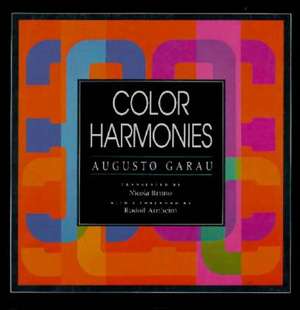Color Harmonies
Autor Augusto Garau Traducere de Nicola Brunoen Limba Engleză Paperback – 31 ian 1993
Because theories of visual perception have traditionally concentrated on form, artists have generally dealt with the problem of color through their own observation and intuition. In Color Harmonies, Augusto Garau systematically investigates the role of both color and form in visual perception and presents an original theory of the aesthetic relations among colors.
Garau, a painter who teaches the psychology of form, pays particular attention to the way colors behave when organized in patterns. His theory of color combination addresses two principal compositional elements: the relations between figure and ground and the phenomenon of transparency.
Garau meticulously analyzes the use of color in paintings by masters such as Cézanne, Picasso, and Matisse to show how his theory applies to actual works of art. Containing many full-color examples, his introduction to the workings of color relations is of great practical use to art historians and critics, artists, interior decorators, fashion and set designers, and anyone who works with color to display information or convey emotions.
"In an area of the psychology of art where reliable guidance is still so hard to come by, [Garau's] well-supported contributions to the theory of color composition ought to be welcomed by practitioners and scholars alike."—from the Foreword by Rudolf Arnheim
Garau, a painter who teaches the psychology of form, pays particular attention to the way colors behave when organized in patterns. His theory of color combination addresses two principal compositional elements: the relations between figure and ground and the phenomenon of transparency.
Garau meticulously analyzes the use of color in paintings by masters such as Cézanne, Picasso, and Matisse to show how his theory applies to actual works of art. Containing many full-color examples, his introduction to the workings of color relations is of great practical use to art historians and critics, artists, interior decorators, fashion and set designers, and anyone who works with color to display information or convey emotions.
"In an area of the psychology of art where reliable guidance is still so hard to come by, [Garau's] well-supported contributions to the theory of color composition ought to be welcomed by practitioners and scholars alike."—from the Foreword by Rudolf Arnheim
Preț: 170.76 lei
Preț vechi: 214.13 lei
-20% Nou
Puncte Express: 256
Preț estimativ în valută:
32.68€ • 33.47$ • 27.18£
32.68€ • 33.47$ • 27.18£
Carte indisponibilă temporar
Doresc să fiu notificat când acest titlu va fi disponibil:
Se trimite...
Preluare comenzi: 021 569.72.76
Specificații
ISBN-13: 9780226281964
ISBN-10: 0226281965
Pagini: 100
Ilustrații: 10 halftones, 40 color plates
Dimensiuni: 203 x 203 x 8 mm
Greutate: 0.3 kg
Ediția:1
Editura: University of Chicago Press
Colecția University of Chicago Press
ISBN-10: 0226281965
Pagini: 100
Ilustrații: 10 halftones, 40 color plates
Dimensiuni: 203 x 203 x 8 mm
Greutate: 0.3 kg
Ediția:1
Editura: University of Chicago Press
Colecția University of Chicago Press
Cuprins
Foreword by Rudolf Arnheim
Preliminary Note
Introduction
1. Juxtaposing a Pure Color to a Mixture That Contains That Color
2. Complete Inversion
3. Partial Inversion
4. Shared Dominant
5. Shared Subordinate
6. Figural Unity and Chromatic Unity
7. Applications in Painting
8. Examples of Chromatic Juxtapositions in Pictorial Works by Cézanne, Picasso, and Matisse
9. Complete Transparency in the Perception of Colored Displays
10. An Anomalous Case of Perceptual Transparency
Bibliography
Preliminary Note
Introduction
1. Juxtaposing a Pure Color to a Mixture That Contains That Color
2. Complete Inversion
3. Partial Inversion
4. Shared Dominant
5. Shared Subordinate
6. Figural Unity and Chromatic Unity
7. Applications in Painting
8. Examples of Chromatic Juxtapositions in Pictorial Works by Cézanne, Picasso, and Matisse
9. Complete Transparency in the Perception of Colored Displays
10. An Anomalous Case of Perceptual Transparency
Bibliography
